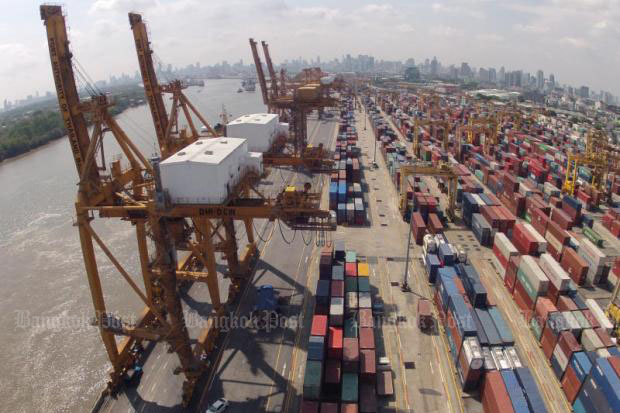Thailand: Q3 exports poised for biggest drop
Exports are set to experience the biggest drop of the year this quarter, marred by rising Sino-US trade tensions and relocation in the global supply chain, says a KTB economist.
“Every country has been reeling from the effects of the trade war, resulting in lower imports and investment,” said Jitipol Puksamatanan, chief market strategist of the global markets group at Krungthai Bank. “Countries have begun halting production and altering their supply chain.”
KTB forecasts annual shipments to contract by 1% this year, assuming GDP growth of 3%.
Despite growing pessimism, exports could recover in the fourth quarter as completed relocation of production bases helps rev up a new round of exports, Mr Jitipol said.
The last time annual exports contracted was in 2015, when shipments plummeted by 5.6% year-on-year.
That dismal figure was attributed to the global economic slowdown, low oil and farm prices, competitive currency devaluation and Thailand’s structural economic problems — namely, labour-intensive manufacturers shifting their production base to neighbouring countries for cheaper costs.
In 2019, exports unexpectedly rose for the first time in five months in July, up 4.3% year-on-year, largely boosted by higher shipments of gold as a safe-haven asset.
But July’s exports of key commodities and industrial items were still in the red.
For the first seven months, exports fell by 1.9% from the same period last year to US$144 billion, generating a trade surplus of $4.053 billion.
Somchai Jitsuchon, research director for inclusive development at the Thailand Development Research Institute, said the 2020 US election and China’s future response will determine the outcome of the Sino-US trade dispute.
Further observation has to be made of whether other trade partners of the US will adopt an anti-US policy, he said.
LOWER RATE POSSIBLE
With the baht’s value continuing to remain strong and the slowdown hampering confidence among consumers and investors, further easing of monetary policy could help shore up growth momentum.
The benchmark interest rate could be reduced to 1% in 2020, with a 25-basis-point cut likely in December and another cut projected in next year’s first half, Mr Jitipol said.
But there should be other tools, such as taxing capital inflows or adopting a spectrum of interest rates, to manage economic conditions, he said.
Thailand’s economy is not expected to fall into a recession over the next two years, but there are signs of concern such as high household debt, income shock from contracting exports and lower tourist arrivals, higher lending through savings cooperatives, and loosened lending rules for large corporations, Mr Somchai said.
“If left unaddressed, these could turn into a minor Tom Yum Kung financial crisis and possibly usher in a recession in the future,” he said, referring to the Asian financial meltdown of 1997.
Source: https://www.bangkokpost.com/business/1738599/q3-exports-poised-for-biggest-drop


 English
English




